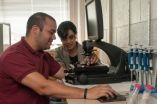(Press-News.org) CLEMSON — Clemson University psychology professor June Pilcher returned recently from Austria, where she worked with University of Vienna researchers to study ways college students' sleep habits affect how they function socially.
Pilcher received a Fulbright-Freud Award to work with the Social, Cognitive, Affective and Neuroscience Unit (SCAN) at the University of Vienna. She also worked with the Sigmund Freud Museum, giving a series of talks and lectures.
Pilcher participated in research with the university's SCAN unit, a center that conducts research in the fields of social neuroscience, cognitive neuroscience and affective neuroscience. Collaboratively, they initiated two research projects, the first focusing on sleep habits and social cognition in college students.
"This project will provide us with data that will allow us to better understand how sleep is related to social functioning," she said.
The group currently is analyzing the results of data collected from approximately 40 students.
The second project, still being developed, will focus on how brain stimulation affects self-control when people are sleep-deprived. The study will examine the ability of the participants to perform a series of tasks after brain stimulation, while also measuring emotion and empathy. Data collection is anticipated to begin in January 2013.
Pilcher plans to continue these projects at Clemson by involving her students.
"Although there was not enough time to complete either of these projects while I was in Vienna, I will continue to work with my new collaborators, which will offer my Creative Inquiry teams and graduate students the opportunity to be involved in an international research effort," said Pilcher.
At the University of Vienna, Picher also taught an upper-level seminar on brain and behavior to a class of 40 undergraduate students.
"I enjoyed teaching and interacting with the students very much," said Pilcher. "The Austrian students were much like our students at Clemson."
INFORMATION:
The Fulbright program is a program sponsored by the U.S. Government that promotes educational exchange between the United States and other countries.
See Pilcher's related blog post about her trip at http://bit.ly/QlQkJB
Clemson psychology professor conducts sleep research at Vienna university
2012-09-20
ELSE PRESS RELEASES FROM THIS DATE:
Satellite sees post-Tropical Cyclone Lane fizzle in a blanket of low clouds
2012-09-20
Former Hurricane Lane has fizzled and its remnant circulation was spotted in a blanket of low clouds in the Eastern Pacific Ocean.
NOAA's GOES-15 satellite sits in a fixed orbit over the western U.S. and captures continuous visible and infrared imagery of the western U.S. and the Eastern Pacific Ocean. On Sept. 19 at 11:45 a.m. EDT, GOES-15 captured a visible image of post-tropical Lane's remnants that appear as a small circulation center. The center was located over 1,000 miles from Baja California in an extensive field of stratocumulus clouds. Stratocumulus clouds are ...
Evolution is as complicated as 1-2-3
2012-09-20
EAST LANSING, Mich. — A team of researchers at Michigan State University has documented the step-by-step process in which organisms evolve new functions.
The results, published in the current issue of Nature, are revealed through an in-depth, genomics-based analysis that decodes how E. coli bacteria figured out how to supplement a traditional diet of glucose with an extra course of citrate.
"It's pretty nifty to see a new biological function evolve," said Zachary Blount, postdoctoral researcher in MSU's BEACON Center for the Study of Evolution in Action. "The first ...
Study shows how consumers shift expectations and goals
2012-09-20
NEW YORK - September 19, 2012 - Sally and Harry are about to invest in their company's 401(k) plan. Sally chooses the best performing mutual fund, which has high risks but boasts a 25 percent year-to-date return. Harry, after considering the tradeoffs between risks and rewards, opts for a lower performing fund with an 8 percent year-to-date return. When they receive their next quarterly performance reports, both Sally and Harry discover that their funds have met their initial expectations. Are they satisfied? If not, why? And how could their levels of satisfaction be improved?
One ...
Using a laser to 'see' the smallest world
2012-09-20
(Santa Barbara, Calif.) –– A multi-university team has employed a high-powered laser based at UC Santa Barbara to dramatically improve one of the tools scientists use to study the world at the atomic level. The team used their amped-up electron paramagnetic resonance (EPR) spectrometer to study the electron spin of free radicals and nitrogen atoms trapped inside a diamond.
The improvement will pull back the veil that shrouds the molecular world, allowing scientists to study tiny molecules at a high resolution.
The team, which includes researchers from UCSB, University ...
UGA researchers boost efficacy of drugs by using nanoparticles to target 'powerhouse of cells'
2012-09-20
Athens, Ga. - Nanoparticles have shown great promise in the targeted delivery of drugs to cells, but researchers at the University of Georgia have refined the drug delivery process further by using nanoparticles to deliver drugs to a specific organelle within cells.
By targeting mitochondria, often called "the powerhouse of cells," the researchers increased the effectiveness of mitochondria-acting therapeutics used to treat cancer, Alzheimer's disease and obesity in studies conducted with cultured cells.
"The mitochondrion is a complex organelle that is very difficult ...
Johns Hopkins astrophysicist spies ultra-distant galaxy amidst cosmic 'dark ages'
2012-09-20
With the combined power of NASA's Spitzer and Hubble space telescopes as well as a cosmic magnification effect, a team of astronomers led by Wei Zheng of The Johns Hopkins University has spotted what could be the most distant galaxy ever detected.
Light from the young galaxy captured by the orbiting observatories shone forth when the 13.7-billion-year-old universe was just 500 million years old.
The far-off galaxy existed within an important era when the universe began to transit from the so-called "Dark Ages." During this period, the universe went from a dark, starless ...
The 'slippery slope to slime': Overgrown algae causing coral reef declines
2012-09-20
CORVALLIS, Ore. – Researchers at Oregon State University for the first time have confirmed some of the mechanisms by which overfishing and nitrate pollution can help destroy coral reefs – it appears they allow an overgrowth of algae that can bring with it unwanted pathogens, choke off oxygen and disrupt helpful bacteria.
These "macroalgae," or large algal species, are big enough to essentially smother corals. They can get out of control when sewage increases nitrate levels, feeds the algae, and some of the large fish that are most effective at reducing the algal buildup ...
The key to cooperation? Think fast
2012-09-20
It's an age old question: Why do we do good? What makes people sometimes willing to put "We" ahead of "Me?" Perhaps our first impulse is to be selfish, and cooperation is all about reining in greed. Or maybe cooperation happens spontaneously, and too much thinking gets in the way.
Harvard scientists are getting closer to an answer, showing that people's first response is to cooperate and that stopping to think encourages selfishness.
David Rand, a Post-Doctoral Fellow in Psychology, Joshua Greene, the John and Ruth Hazel Associate Professor of the Social Sciences ...
New cranial neural crest cell line developed
2012-09-20
New Rochelle, NY, September 19, 2012-- Researchers have successfully developed a stable population of neural crest cells derived from mice that can be grown in large quantities in the laboratory and that demonstrates the potential to develop into many different cell types needed throughout the body. This powerful new research tool for understanding stem cell biology and human development and disease is described in an article published in Stem Cells and Development, a peer-reviewed journal from Mary Ann Liebert, Inc., publishers. The article is available free on the Stem ...
GEN reports on growth of biobanking operations
2012-09-20
New Rochelle, NY, September 19, 2012— Many biotech observers maintain that the future of healthcare will largely be based on the field of personalized medicine, reports Genetic Engineering & Biotechnology News (GEN) (http://genengnews.com). Although drug discovery efforts require access to increasingly larger arrays of biosamples, demand is exceeding supply, fueling the growth of the biobanking market, according to a recent issue of GEN (http://genengnews.com/gen-articles/biobanking-confronts-growing-pains/4481).
"Personalized medicine is all about tailoring specific ...







